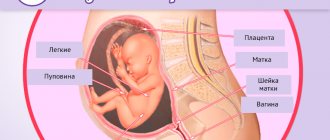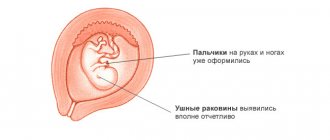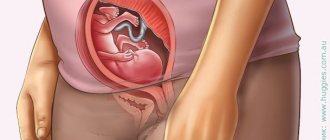At this time, the long-awaited registration of maternity leave awaits you - now is the time to relax, because the expectant mother is already experiencing all the most difficult manifestations of pregnancy.
From now on, start preparing for childbirth, because it’s just around the corner! Meanwhile, the baby is almost completely formed and developed, now he looks just like a newborn, he just needs to gain the necessary weight. The 7th month of pregnancy marks the final third trimester. The seventh month includes 27-31 weeks.
In this article we will talk about the development of the baby and the well-being of the expectant mother. Let's talk about applying for maternity leave and being examined by a doctor. We will also offer recommendations and advice.
Child development at 7 months of pregnancy
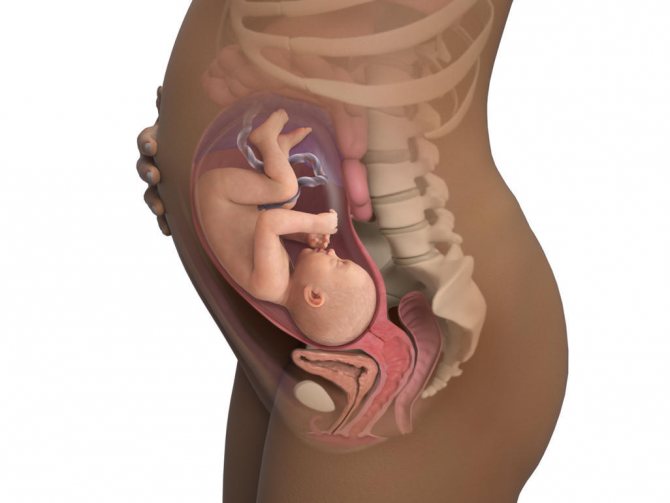
27 obstetric week of pregnancy
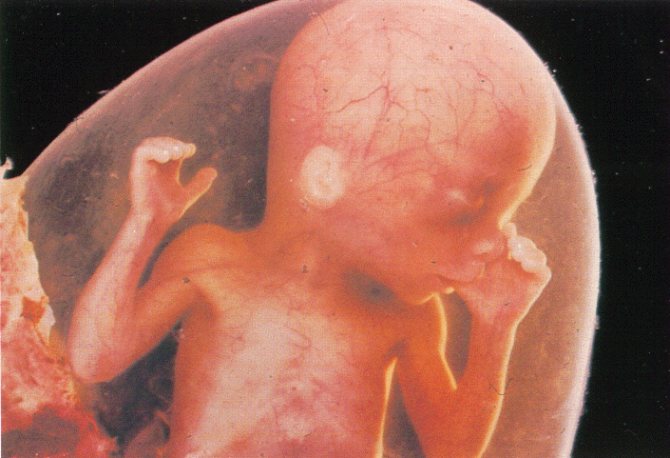
At 27 weeks, the weight of the fetus is 900 grams and its height is 36 cm. Over the course of a week, it will gain about 100 grams more.
Already at the 27th week of pregnancy, all the organs of the future baby are already formed; only their development, improvement and establishment of the relationship of all systems and organs continues.
The brain is actively growing and developing, nerve cells are actively working, and protective myelin sheaths appear around the fibers. The fetus already has quite long hairs on its head. Active preparation of the fetal respiratory system continues. This consists in the formation of the alveolar ducts and alveoli. From this time, the production of a specific substance - surfactant - begins. It is necessary to open the baby's lungs during the first breath.
Every day the skeletal and muscular system of the fetus is strengthened. The baby's arms and legs become stronger. The fetus already has quite long hairs on its head. There are eyelashes, eyebrows, nails are growing, but have not yet reached the edges of the fingers, the ear and nasal cartilages are still soft.
28 obstetric week of pregnancy
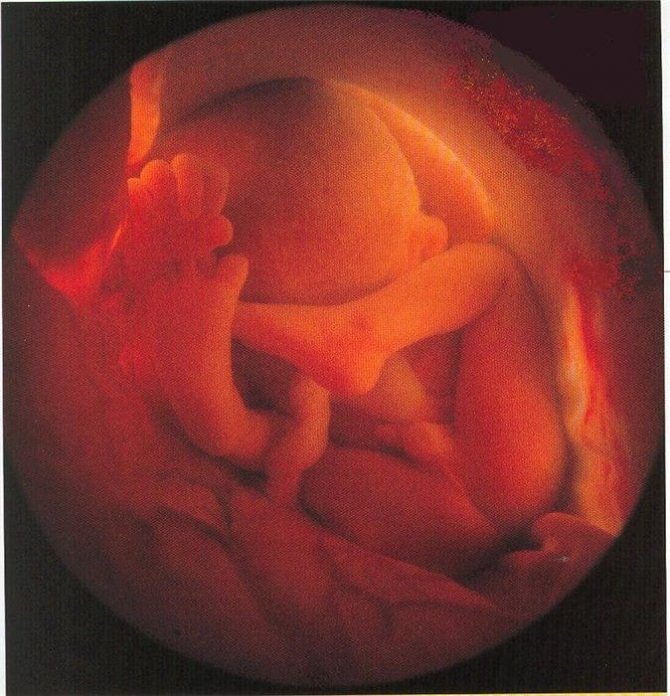
The child’s weight already reaches 1 kg, and his height is approaching 35-37 cm.
At the 28th week of pregnancy, the fetal adrenal glands produce hormones that stimulate more intense formation of surfactant in the alveoli than before. The alveoli themselves begin to contact the blood vessels. This is preparation for the exchange of oxygen and carbon dioxide with the blood, which the fetus will need after birth, when it begins to breathe on its own.
The mass of the brain increases, it begins to actively develop - until this moment the brain was smooth. After 28 weeks, convolutions begin to form in it. The heart beats at a frequency of 150 beats per minute. The grasping and sucking reflexes are being adjusted, and the skeleton is being formed. After some time, the bones will only increase in size and harden.
The baby has already learned to open and close his eyes, as well as blink, since the pupillary membrane has already disappeared.
Starting this week, you should pay special attention to your well-being. Because from 28 to 32 weeks the fourth critical period of pregnancy occurs. At this stage, the normal course of pregnancy can be disrupted by such phenomena as: late gestosis, placental insufficiency, placental abruption.
29 obstetric week of pregnancy
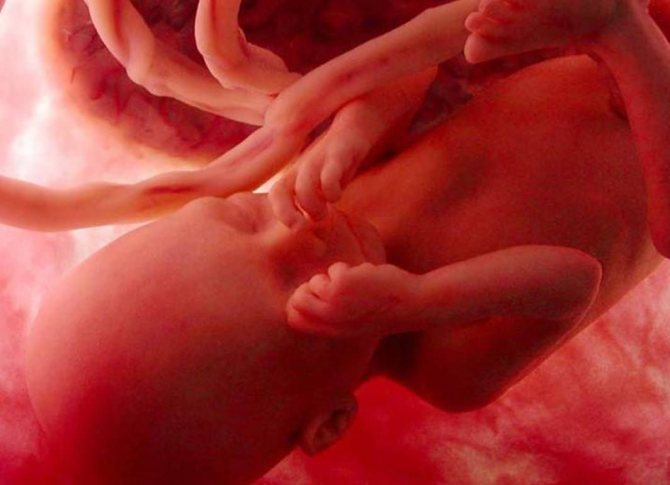
The baby's height this week is about 37-38 cm, and the child's weight is on average 1200 grams.
At the 29th week of pregnancy, the process of systemogenesis is almost complete - the organs are fine-tuning their work according to the “rules” of the system to which they are directly related.
The liver has become larger, the heart has grown, the kidneys are not yet quite mature, but their calyces and pelvis continue to increase in size, and the kidneys produce up to 450-500 ml of urine per day.
The organs of the digestive system are still better prepared than others. They work very harmoniously - the esophagus conducts the water swallowed by the baby into the stomach, from there the amniotic fluid is sent to the intestines.
During the waking period, the baby knows how to grab the umbilical cord with his hand, and also has the beginnings of the instinct of self-preservation - with a loud sound, bright light directed at the stomach, with any threat, the baby shudders, shrinks, and groups into a lump. In addition, he knows how to digest food, independently regulate body temperature, focus his gaze, push off strongly and kick.
30 obstetric week of pregnancy
The baby's height at the 30th week of pregnancy is about 38-38.5 cm, and the child's weight is on average 1350-1400 grams.
The baby continues to develop intensively, every day he improves and will soon be able to survive outside the mother’s body. At this time, he has already accumulated a sufficient amount of subcutaneous adipose tissue, and the thermoregulation system continues to develop. The nervous system is also actively developing.
The convolutions become deeper, the brain mass increases. During this period, the process of differentiation of the cerebral cortex is completed. The foundations have already been laid, but the convolutions and furrows are still being formed. Every day new neural connections arise, so the movements of the fetus are no longer so chaotic, but very rational. The brain takes control of organs, body systems and several dozen reflexes - motor, sucking, breathing and others.
Lung tissue is still developing. The alveoli are almost formed. At this time, a very important substance accumulates - surfactant. The baby’s life depends on its sufficient quantity. The intestines can already contract and make movements reminiscent of full peristalsis.
31st obstetric week of pregnancy
The baby's height this week is about 39-40 cm, and the average weight is from 1400 to 1600 grams.
At 31 weeks of pregnancy, the baby's body becomes more rounded, and the first folds that are characteristic of babies appear on the wrists and ankles. Pigment begins to accumulate in the iris of the child’s eyes, which will later determine the color of his eyes.
The proportions of the body have leveled out, the head has an almost correct shape, the legs are longer than the arms. At 31 weeks, the process of getting rid of lanugo, the blond hair that covers the entire body and retains vernix, is in full swing.
The lubricant itself also becomes less. Soon it will persist only where mechanical rubbing is possible: in the groin, under the arms, in the elbow folds of the arms, in the popliteal folds - on the legs and under the chin.
The number of pancreatic cells has already increased in the fetus. It is almost ready to produce enzymes that break down organic substances. The pancreas also actively produces insulin to independently protect the child’s immunity. The kidneys continue to excrete amniotic fluid, which the baby periodically swallows, the liver is finishing its improvement, and its lobules, which are responsible for removing toxins, have almost formed.
Pregnancy 4 months: fetal development
During this period, hearing actively develops photo: babycenter.com
By the end of 4 months, the child is completely dependent on the placenta, which has finally stood guard over his full development. Thanks to this, a woman begins to feel light and energetic. The placenta not only “feeds” and supplies the fetus with oxygen, it removes waste products of the small organism, prevents the penetration of toxic compounds, harmful bacteria and viruses, and also synthesizes the hormones and proteins necessary for the baby.
This period for a child marks the beginning of his energetic life. The first reflexes develop - swallowing and sucking. He gets used to the new space: swims, clenches his fists in an attempt to grab something, sucks his finger. Responds to loud noises by changing activity.
Lanugo appears on his body - a protective fluff, which will later be replaced by thicker and longer vellus hairs. Eyebrows and eyelashes frame eyes that can blink. Nails are forming.
We recommend 3 months of pregnancy
Future girls develop ovaries, boys develop a prostate. Using an ultrasound, you can see what gender your child will be.
By the end of the month, your baby will reach up to 20 cm in length and weigh up to 200 g.
Premature birth at 7 months
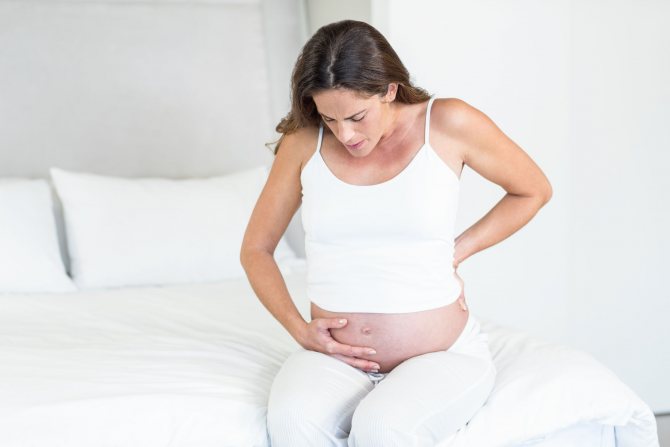
Many mothers, having read stories or heard stories about someone’s premature birth, begin to stress themselves out and be afraid of giving birth prematurely. We hasten to reassure you - premature birth at 7 months is rare. As a rule, childbirth occurs due to a complicated pregnancy or due to problems with the mother's health. In modern medicine, the outcome of childbirth is almost always successful. By this time the fruit, although still small, is already viable. Doctors will help him take his first breath and create all the necessary conditions for his independent growth and development.
As for the numbers, at the beginning of the month the baby has an 80% chance of survival. At the end of the month, the survival rate for premature babies is 94%.

If you're really worried about giving birth prematurely, think about what you can do to distract yourself. Find something useful or enjoyable to do—whether it's a maternity fitness class, going to the pool, shopping for baby clothes, or meeting up with friends. Talk to them about your experiences. Remember that the baby feels all your emotions and now there is no need to be nervous and worry. Even if there is a risk of premature birth, think only about the good and your baby will be born on time!
Nutrition for a one-year-old child
In a year and a month, the child eats five times a day. Some children are already switching to four meals a day. The diet should consist of dairy products, vegetables, cereals, and meat. At this age, you can safely add raw vegetable salads to the menu, made from cucumber, grated carrots, and peeled tomatoes. The milk allowance for a baby is 700 ml, including the milk used for cooking. He should eat 85 grams of meat. The egg is not yet given as a whole egg; only the yolk is added to dishes. Your baby should not be fed cereal more than once a day.
At the beginning of the second year of life, children already know how to chew quite well. Therefore, they can be given bread, chopped meat, and not just pureed dishes. It is advisable to forget about the pacifier; it forms an incorrect bite and slows down the development of chewing skills. It is recommended to give protein products and meat to the child in the first half of the day, as they take longer to digest. In the evening you can feed him porridge or vegetable puree. Here is an approximate menu for a baby at one year and a month:
- Morning meal. Steam omelette, porridge with milk, bread and butter, tea
- Dinner. Mashed borscht, steamed chicken soufflé, mashed potatoes
- Afternoon snack. Grated apple, unsweetened cookies, natural yogurt
- Evening meal. Cottage cheese casserole, milk, a piece of bread with butter.
Each child has his own taste preferences. When creating a menu, they must be taken into account. During the year and month, sweets and chocolate are still contraindicated for children; they cannot be given smoked sausage, various canned foods and marinades. After a year, you can try citrus fruits in small portions to avoid allergies. The same applies to fish; it is advisable not to include it in your diet more than once a week. It is better to prepare mixed vegetable puree, including carrots, zucchini, pumpkin, broccoli and cauliflower. If your child likes it, you can give him small pasta with butter or milk.
Fetal movements at 7 months of pregnancy
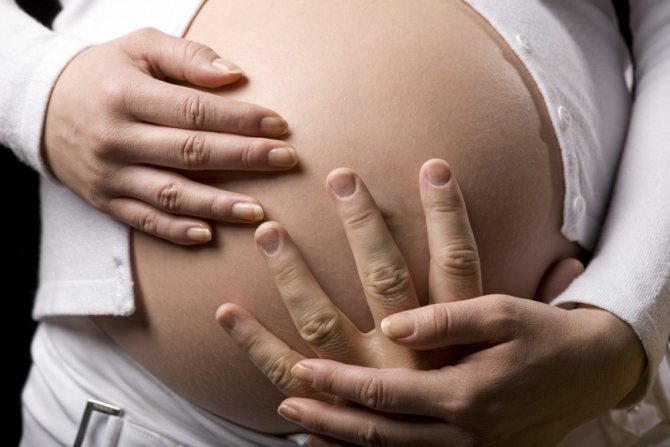
At the 7th month of pregnancy, fetal movements are most active. At 27–31 weeks, the number of fetal movements is already about 600 times a day. However, the amount that the mother can feel should still be at least 8-10 times in one hour. The exception is the child's sleep. For 3-4 hours you may not “feel” your baby - during this time the baby does not make active movements. The expectant mother should remember certain cycles of activity of the child. The greatest activity is observed from 7 pm to 4 am, and the decrease in activity or the so-called resting state occurs from 4 am to 9 am.
During daytime or nighttime rest, the uterus relaxes, and the mother's rocking movements during physical activity stop, so the baby's activity increases. At this stage, gynecologists often recommend that the expectant mother keep a count of the number of fetal movements. You can do this simply by having the sign below with you.
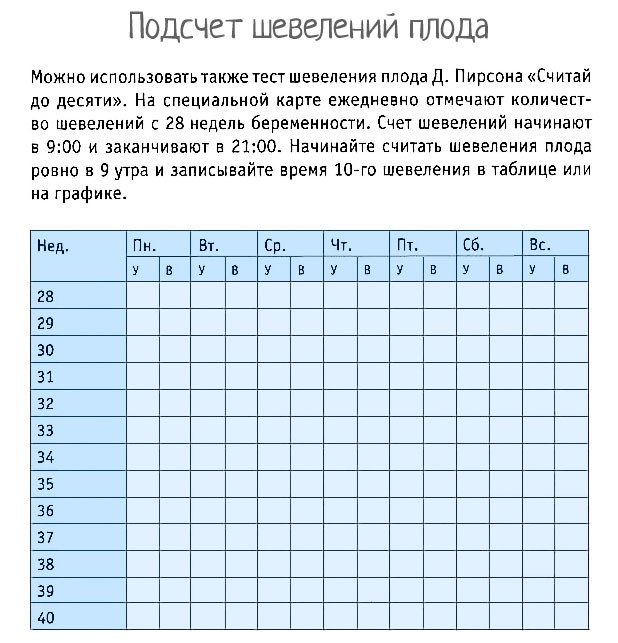
It is worth considering that already from 32 weeks the number of movements is reduced due to the weight and growth of the fetus. As already mentioned, he does not have enough space for active movements; he becomes cramped in the uterus.
It is important for the expectant mother to know that excessive activity, passivity or prolonged lack of movement for 8-10 hours should be a warning! You should definitely see a doctor, he will definitely listen to the fetal heartbeat or send you for an ultrasound.
Fetal development at 4 months of pregnancy
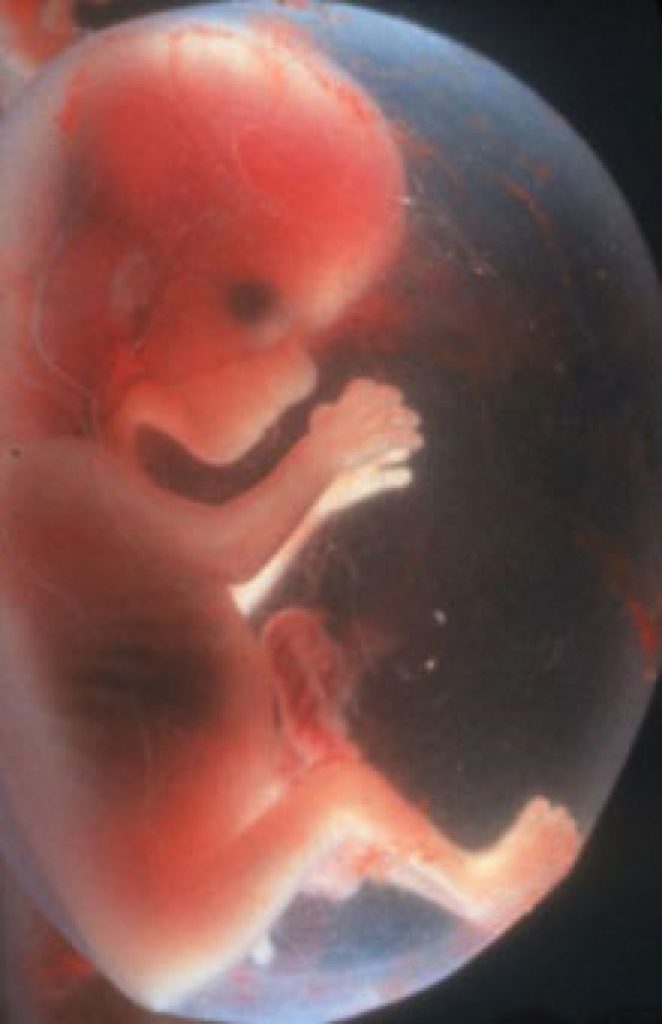
From the beginning of the 4th month (14th obstetric week of pregnancy), the growth of the fetus is about 10-12 cm, and the weight is approximately 30-50 grams.
The baby changes both externally and internally. The active development of the spine, the formation of the muscular system and bones continue. The baby begins to learn to move its arms and legs, roll over and even somersault. Besides:
- The eyes approached the bridge of the nose;
- The ears are located in their anatomical place;
- The eyeballs and optic nerves have formed;
- The first emotions and grimaces appear on the fetus’s face;
- The child reacts to the mother’s voice, bright light, loud sounds;
- The fetus constantly trains the respiratory system, it inhales and exhales amniotic fluid;
- A vernix lubrication is visible on the fetal body, the purpose of which is to protect the delicate skin;
- The salivary and sweat glands begin to function;
- The urinary system and gallbladder work.
By the end of the 14th week, the baby will be able to do a lot: suck his thumb or fist, play with his hands with the umbilical cord and even frown!
15th obstetric week of pregnancy
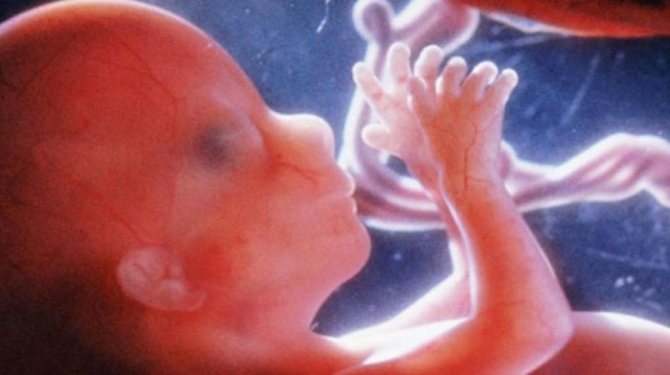
The fetus's growth this week is about 12-13 cm, and its weight is approximately 50-75 grams.
At 15 weeks of pregnancy, the brain is actively forming. Although there are no convolutions yet, their rudiments, represented by small grooves, are already beginning to appear. Brain neurons continue to divide and are already beginning to influence the actions of the future baby. Besides:
- The gallbladder begins to produce bile and release it into the intestines.
- The cerebral cortex is actively forming. Brain convolutions appear.
- The body begins to look more proportional. The fetal legs become longer than the arms. The head is also visually smaller in relation to the body.
- Lanugo fuzz appears on the body. Hair in the eyebrow and scalp area becomes thicker. The follicles begin to produce enzymes that will affect the color of the hair in the future.
- At the 15th week of pregnancy, the corpus luteum has already completed its task. All functions to ensure the life of the unborn child begin to be performed by the placenta.
- The heart is actively working. It is believed that it is capable of pumping twenty liters of blood per day.
- The embryo already has its own blood - it is quite possible to determine the blood type and Rh factor already at this stage.
16th obstetric week of pregnancy
At the 16th week of pregnancy, the fetus is about 13-14 cm tall and weighs approximately 75-110 grams.
Internal organs begin to master their functions - contract, secrete enzymes, filter.
The baby’s bone marrow is already responsible for hematopoiesis, and the composition of the blood is also fully formed. The fetal body becomes more proportional: the legs grow in length, and the head is no longer so large in relation to the body.
The baby's head no longer falls on the chest. The neck muscles are constantly strengthening, so the child is able to hold his head straight. The digestive and urinary systems work, the liver and kidneys are included in the work. The immune system is actively functioning, so the baby is already protected from external risks.
17th obstetric week of pregnancy
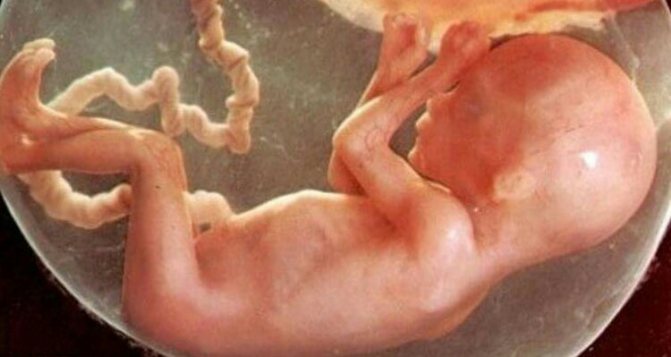
The fetal growth this week is about 15-16 cm, and the weight is approximately 110-150 grams.
At the 17th week of pregnancy, the fetus begins to produce interferon and immunoglobulin, so its body is already protected by the immune system. This week, subcutaneous fat deposits begin to form, which will protect the child from the cold. The skin itself becomes more sensitive, and the sweat glands become active. At week 17, the baby’s permanent teeth form; they are located behind the milk teeth.
The heart is finally formed, the lungs are improved, the adrenal glands are actively working and the necessary hormones are produced. By this week, the fetus can already distinguish between voices and sounds. The sound is transformed into a nerve impulse and reaches the brain, talk to your baby, sing lullabies to him, he will love it!
Well-being of the expectant mother at 7 months
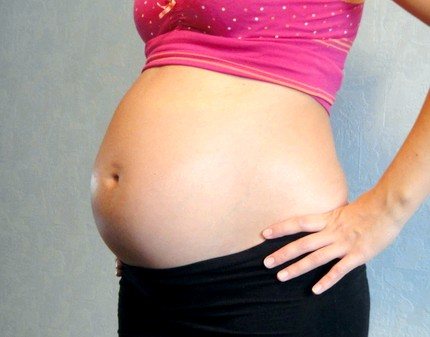
The feelings of a future mother at 7 months are not the easiest. The heaviness of the kilograms gained and the fatigue from the previous months take their toll. Due to the growing tummy, the center of gravity has shifted and a “duck walk” has appeared. Mommy gets tired faster, she may be tormented by various pains: the lower abdomen hurts and pulls, the pubic bone hurts, the perineum hurts, and unpleasant sensations arise in the lumbar region. Unpleasant feelings and spasms spread to the back area.
Due to the increased volume of circulating blood, many pregnant women experience increased blood pressure and a rapid pulse, which can be felt literally “throughout the whole body.”
At this time, the pregnant woman’s breasts are getting ready to feed the baby - the ducts are expanding, the lobules of the gland are enlarging, which will soon begin their active work. The breasts become even larger, sensitivity and pain increase. We talked all about breastfeeding here.
The height of the uterine fundus corresponds to the period of obstetric pregnancy - it is from 27 to 30 cm. The enlarged uterus significantly compresses the internal organs of the expectant mother, which can cause functional disorders of the gastrointestinal tract to intensify. Heartburn, flatulence, hemorrhoids and constipation are making themselves felt more and more often.

Compression of the lungs leads to shortness of breath during exercise. The mother's bone apparatus is being prepared for the upcoming birth. The hormone relaxin produced for this purpose weakens the ligaments and muscles. Since relaxin does not have a selective effect, it has a vasodilating effect, it can increase varicose veins.
Right now, fluid may begin to linger in the tissues, which can cause swelling. At the appointment, the doctor will assess the degree of swelling, and if the condition is threatening, he may refer the pregnant woman to a hospital for maintenance treatment.
Due to the increased amount of blood in the body, vaginal discharge increases. This is normal, but only on condition that the woman does not have pain in her lower abdomen and does not have bloody or brown discharge. Healthy discharge is white or transparent, odorless or with a slight kefir odor, without itching .
If pink, beige, heterogeneous discharge with clots, or bloody discharge of any intensity appears, you need to call an ambulance; it is possible that the woman is at risk of premature birth!
Physical development of a child at 1 year and 1 month
During the first year of life, the baby learned to control his body. It started with gaining control of his head, then he learned to control his torso, arms and finally his legs. He can already move independently and manipulate objects . It's time to improve these skills.
At the end of the thirteenth month, your baby is already able to take an upright position and after a while sit back down. He takes his first, not yet completely independent steps: holding on to something - for example, furniture or a crib railing - he moves from place to place.
Some children can already stand on their own and walk quite well. Does your baby not know how to do this yet? Don't worry, learning to walk is not a race. A child should start walking when he is ready for this - when he has strong enough muscles and bones, a sufficiently developed sense of balance, etc. Now the main thing is that he makes progress and goes through the subsequent phases of development.
The coming months will be marked by falls and collisions (and sometimes even bruises and contusions). No surprise - this is a natural stage of learning to walk. Don't worry: it won't harm the baby. The distance to the ground is still small, and the baby’s internal organs are protected by a layer of fat.
In the second year of life, manual dexterity also improves. At 1 year and 1 month, the child is better and better able to hold a glass and drink from it, puts small toys in a box or picks up pencils spilled on the floor. These new skills will come in handy as he learns to feed himself. Already now the baby should try to handle a spoon or fork on his own, although, of course, at first he does it very ineptly.
Tips for parents:
- Take care of your child's safety. Watch stairs and windows, cover sharp edges with something, remove dangerous objects - for example, large vases standing on the floor. If you haven't done this yet, check the stability of the furniture so that your baby won't tip it over when he tries to climb up.

- React calmly to falls. Don't be overzealous—a parent's overprotective response to a fall can reinforce a child's fear of taking on new tasks. When your baby falls, do not immediately run to help. Encourage him to stand up on his own and try again to bridge the distance between you.
- Buy your child good shoes, preferably orthopedic, with a good last. Wear it at first only at home and for a short time - the baby should get used to it.

- Allow your child to feed himself. Yes, you understand that this will lead to chaos. However, you have to start sometime. If you haven't tried this before, now is the time to do it.
Height and weight at 1 year and 1 month
During the first year, your baby grew by leaps and bounds. Now, in the second year of life, the pace of his development is weakening: over the next 12 months, only about 2 kg will be added to the scales, the baby will grow by about 12 cm.
- Boys have an average weight of 10.6 kg and height of 76.8 cm.
- Girls have an average weight of 9.8 kg and height of 75 cm.
Training contractions (Braxton-Hicks contractions)
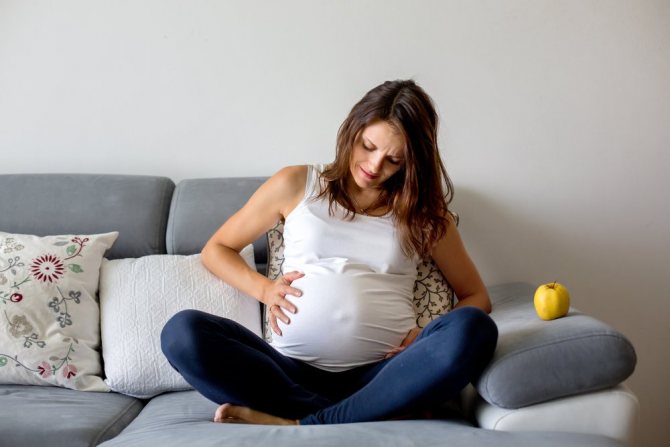
Periodically, at this stage, pregnant women develop a hard or “stony” stomach - this is how training contractions occur, called Braxton-Hicks contractions.
They are uterine contractions that occur to prepare the uterus for real contractions during labor. The difference between them and real contractions is that they do not lead to the onset of labor, which is why they are called training or false.
How to understand that contractions are false, training?
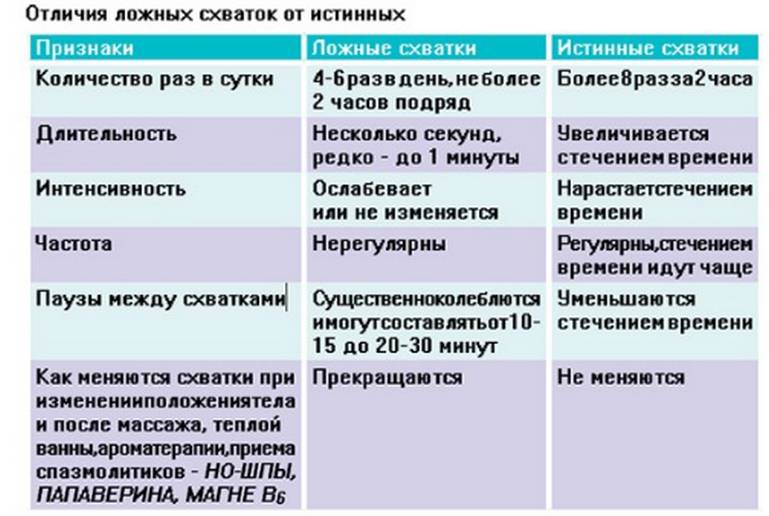
- Firstly, this is the gestational age . If your pregnancy is more than 20 weeks, then most likely these are training contractions. (premonitory or preparatory contractions usually occur at 38-39 weeks).
- Secondly, the duration of the fight . The duration is no longer than one minute.
- Thirdly, the frequency of contractions. False contractions do not have a certain regularity. During such contractions, the stomach can turn to stone several times in a row, then everything calms down.
- Fourthly, the area where the contraction occurs. Sensations arise in any one area: above, below, from the side.
- Fifthly, painlessness and intensity of contractions . During training contractions, discomfort may occur, but not pain. The discomfort will not get worse.
- Sixth, the number of times per day . In case of false contractions, their number does not exceed 6 times a day, and their duration does not exceed 2 hours.
- Seventh, false contractions do not have a specific interval . Pauses between contractions can range from 10-15 minutes to 20-30, but do not decrease over time.
If you have just such contractions, then you don’t have to worry, your body has begun preparing for childbirth.
As already mentioned, contractions occur as a result of the action of hormones on the body, but there are other reasons for the appearance of contractions :
- increased activity of a pregnant woman (physical labor, gymnastics, fast walking, etc.);
- strong tremors, movements and movements of the baby in the uterus;
- stroke your belly frequently;
- Mommy’s emotional experiences and stressful situations;
- sex and orgasm;
- deficiency of fluid in the body;
- a full bladder or rectum that causes pressure on the walls of the uterus.
To alleviate the condition caused by a false contraction, you need to lie down (if the situation allows). Usually this is enough. If a contraction overtakes you while you are lying down, try to relax as much as possible; if you do not feel relief, you need to walk around a little or take a warm shower. If a lot of contractions occur during the day and they cause you inconvenience and unnecessary anxiety, consult a gynecologist, he will select a sedative for you that will help alleviate your condition.
If you notice that training contractions have become more frequent and more painful, contact your gynecologist. It is worth checking whether the cervix is dilating and whether real contractions have begun.
Predictions for the month with Number 4
Opportunities in this number
It's time to roll up your sleeves and work hard for your own good. Labor brought primitive man out of the cave, and it will take you to a new level of responsibility for your actions. What is gained through hard work is very difficult to squander frivolously.
The routine work that you will have to do during this month will not seem very attractive at first glance, but it must be done. How painstakingly and diligently you work over the coming weeks will determine whether you will have a floating vessel on which you can hoist your future luck so that it does not drown in the stormy waters of life’s vicissitudes. Projects started some time ago will require you to carefully “fine-tune” and diligently polish the parts. Household chores will take up more time than usual, as several noticeable gaps will appear due to “lack of hands-on” in the recent past. The month of number four will be the ideal time to finish all the abandoned (due to some tediousness) affairs. You can, of course, once again give up on the imperfections, but then you risk missing out on possible success in the very near future, since you will be busy with routine at that moment. And since there will be a bit of a shortage of gifts from fate this month (almost their complete absence), it is better to get the maximum benefit with your own hands.
This month it may seem to you that those around you have entered into a conspiracy, setting out to burden you with additional problems. I don't know about conspiracy, but you will certainly have to deal with things that require more responsibility than usual. As a consolation, I will inform you that the reputation you acquired this month as a very reliable friend, partner, employee or colleague will be very useful to you in the very near future.
Warnings for the month 4
The most likely mistake of the month: you can get overwhelmed and tired to such an extent that you lose politeness and objectivity and begin to “let loose” on everyone you meet. Carefully! In the heat of the moment, you may say something that you will bitterly regret later. Try to understand: the fact that it’s not easy for you now is no one’s fault but you.
Again, due to excessive fatigue, you can fall into a state of total indifference. But such a careless attitude towards affairs is not recommended at all; console yourself with the thought that “this too will pass”, you just need to push yourself a little.
Another likely consequence of the additional stress of the month is a reluctance to communicate with anyone (“Leave me alone immediately and forever!”). This is a global mistake. In this way, you will alienate those few people who are ready to come to your aid.
Characteristics of the month
Hard work, diligence, responsibility, punctuality, down to earth, reliability, perseverance, patience, consistency.
Energy is in a declining phase. This is not a complete loss of strength, but a noticeable lack of strength. You may feel like you're on your last legs for the entire month. Don’t get carried away with tonics; it’s better to try to learn how to relax properly and have a good rest. Maybe I should read something tantric?
Colors of success this month: blue, gray, light brown, turquoise, green.
Maxim Fedorov
Registration of maternity leave

With the onset of the 7th month of pregnancy, the mother is entitled to maternity leave, which lasts 140 days (70 days before childbirth and 70 days after childbirth), then leave to care for a child up to 1.5 years and 3 years is issued. If you are expecting one baby, your vacation will begin from the 30th week of pregnancy. If you are expecting twins, you are entitled to leave from 28 weeks. But there is no need to wait for these deadlines in order to notify the employer about going on vacation, since you still need to find a replacement for you. It is better to notify him 2-3 weeks in advance.
What is needed to apply for maternity leave?
To apply for leave, you first need to come to the antenatal clinic at 30 weeks (or 28 weeks). After the examination, you will be given a certificate of incapacity for work and a certificate of registration in the early stages of pregnancy. On the day the certificate of incapacity for work is issued, you need to come to work with documents to the HR department. The HR department, on the basis of the application and certificate of incapacity for work, issues an order for granting leave under the BiR. The day indicated on the certificate of incapacity for work is the first day of vacation! To apply for a vacation, you will need to collect some documents:
List of documents for maternity leave
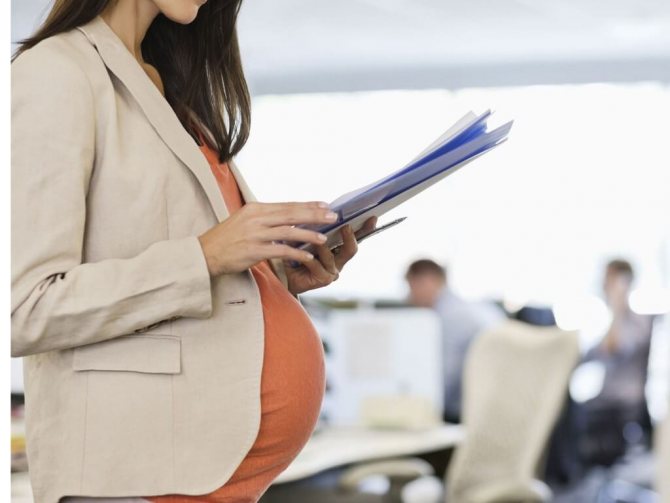
- A completed certificate of incapacity for work. The date from which you go on maternity leave must also be the date from which sick leave is opened.
- Certificate of early registration. This certificate is issued at the antenatal clinic for registration for up to 12 weeks. She is entitled to an allowance of 680 rubles.
- Application for leave. The application form is available at the organization. It’s worth immediately adding a clause about the request to accrue the corresponding benefits, otherwise they will have to be processed separately.
- Passport and its copy.
- If the length of service in the organization is less than 2 years, then it is necessary to provide a certificate of income from the previous organization in Form 182-to calculate payments.
Having received the relevant documents from the pregnant woman, the employer is obliged to assign benefits within 10 days and pay wages on the next day after the appointment (Article 15 of Law No. 255-FZ).
The Labor Code enshrines the right to go on maternity leave and receive benefits for a pregnant woman of any social status , for example:
- Pregnant women who have signed an employment contract (work experience does not matter);
- Full-time students;
- Women in military service;
- Women who work for an individual entrepreneur or are themselves individual entrepreneurs.
If a pregnant woman is temporarily unemployed, she is also entitled to payments. For this purpose, the social authorities. Protection for a pregnant woman must be provided:
- Statement;
- Certificate of incapacity for work issued by the antenatal clinic;
- A certificate confirming that the woman is unemployed.
However, it is worth considering that some types of paid maternity benefits are available to everyone, and some - only to officially employed pregnant women.
And also, do not forget to make a copy of the certificate of incapacity for work for the maternity hospital. A copy may be needed to extend leave in case of complicated childbirth.
We talked in detail about maternity payments for a pregnant woman, as well as child care benefits for 1.5 and 3 years old, in this article.
Visit to the doctor, tests and examinations at 7 months
In the seventh month of pregnancy, a pregnant woman needs to visit the doctor once every two weeks. At your next appointment, you will be prepared and undergo a commission to apply for maternity leave. It includes passing some tests:
- General blood and urine analysis.
- Microscopic examination of vaginal discharge (flora smear).
- Biochemical blood test (according to indications).
- Coagulogram (according to indications).
- Blood test for syphilis (required, repeated).
- Test for the presence of Rh antibodies (only for Rh-negative women).
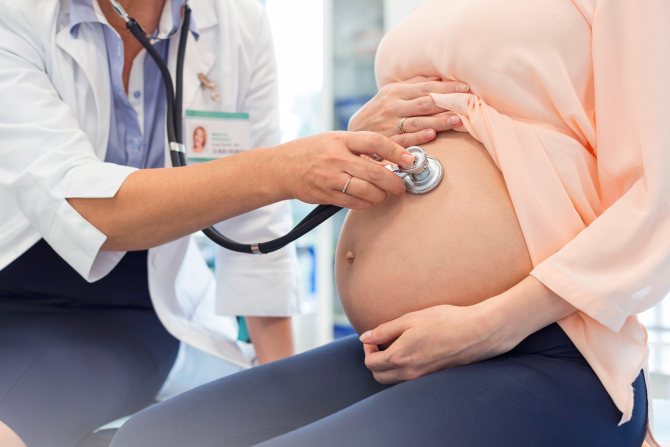
In addition, it is necessary to re-visit the therapist, ophthalmologist and other specialists, depending on the health status of the pregnant woman.
In addition to preparing and registering maternity leave, you will receive standard measurements of the height of the uterine fundus, blood pressure, pulse, assessment of the child’s heartbeat, measurement of abdominal circumference, determination of the position and presentation of the fetus.
At this time, the doctor will issue a birth certificate and an exchange card, which contains the results of all tests and examinations. Now the pregnant woman needs to carry this card with her.
Child development in the seventh month
During this period, the brain enlarges and nerve cells become sensitive to various stimuli. For example, a baby may jump from a sudden noise, or, conversely, calm down. Watch him and you will see this. The final stage in the formation of the brain occurs, the sulci and gyri acquire clarity.
The baby turns his head towards the continuous bright light outside photo: babycenter.com
Over the course of 7 months, the child gained subcutaneous fat, and his skin acquired a pink tint (instead of the previous red). He opens and closes his eyes, framed by eyelashes and eyebrows, in an absolutely meaningful way. Can distinguish tastes thanks to receptors on the tongue. The hair on the head continues to grow.
The fetus continues to train its respiratory system, trying to inhale and exhale voluntarily. Sometimes he swallows amniotic fluid, which causes hiccups. But the lungs are not formed enough for independent life. Therefore, if the baby appears at this time, he will need medical attention.
The body continues to develop. A small heart beats clearly. The immune system has matured and thermoregulation has improved. The baby's kidneys produce up to half a liter of urine per day. The intestines function well. The formation of the hearing aid is completed. Perinatal specialists advise talking to your child more, because he can already distinguish between voices and intonations.
This is a period of intensive exploration of your capabilities. The baby actively plays with the umbilical cord, pushes away from the walls of the uterus and continues to grow.
Tips and recommendations for a pregnant woman
- As in previous months, take more walks in the fresh air . If walking causes pain, discomfort and fatigue, just stay in the fresh air without long walks, and also ventilate the room you are in more often.
- Rest often with your legs elevated to relieve swelling and fatigue in your legs.
- When getting out of bed from a lying position, first turn on your side and then stand up . This is necessary in order not to strain the abdominal press.
- To prevent varicose veins from getting worse, do not cross your legs.
- Do not carry or lift heavy objects, do only light physical work at home - entrust cleaning carpets, washing windows, floors and bathtubs to other household members.
- If you haven't worn a brace yet, now is the time to get one . The bandage will remove most of the load from the lower back and improve overall well-being. In addition, it can help the baby take the correct position with its head down, and if the fetus has already turned to the desired position, prevent it from turning over.
- Continue to eat healthy, eliminating unhealthy foods and supplementing your diet with healthy foods . Eat small meals, don't forget about snacks. Avoid consumption of salty foods.

- Fall asleep only on your left side; sleeping on your back at 7 months is dangerous. The weight of the baby and mother compresses the blood vessels, especially the vena cava. If the vein is compressed, blood circulation will be impaired. This is dangerous due to loss of consciousness during sleep and hypoxia for the fetus.
- If you are concerned about itchy abdominal skin, use moisturizing creams or oils . Buy special cosmetics for pregnant women.
- Perform the knee-elbow position as often as possible. It is necessary for: eliminating congestion in the abdominal organs; prevention of edema, cystitis, pyelonephritis; reducing pressure on the kidneys and bladder; improving blood circulation in all pelvic organs. The knee-elbow position contributes to the correct positioning of the fetus, as well as normalization of pressure. The exercise must be performed for at least 10-15 minutes.
- Now that you have received maternity benefits, start arranging the children's room, making repairs, purchasing a dowry for the baby and packing bags for the maternity hospital.








